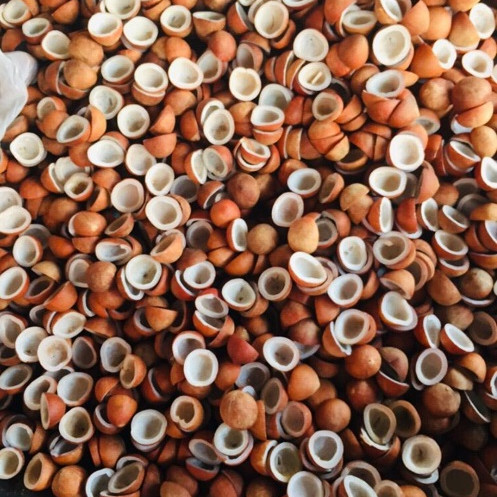Naturally growing coconut palms are a significant source of copra, but commercial estates and plantations now predominate. The nuts are husked by bringing them down forcibly on a sharp point, by hand or mechanically. The shell is then cracked, usually into two halves, with a chopping knife, exposing the meat, which is about 50 percent water and 30 to 40 percent oil. About 30 nuts provide meat for 10 pounds (4.5 kg) of copra. Whole copra, also called ball or edible copra, is produced by the less common drying of the intact, whole nut kernel.
Exposing the kernels to the air and sun was the earliest method of drying and is still extensively followed; it gives a good quality white copra. A more rapid process, adopted particularly where the humidity is high, is kiln drying, used generally in Indonesia. The kiln, essentially a fire pit overlaid with a grid, on which the copra is placed, is sheltered from rain by a roof. More uniform quality copra is produced by hot-air drying, first introduced in India and the Samoan islands. The copra is drawn through a heated tunnel, meeting a counter current of hot air. A fine, white copra of higher value than the sun-dried product is obtained. Well-dried copra contains 4 to 5 percent moisture and 63 to 70 percent oil.
Coconut oil is obtained from the cleaned and crushed copra chiefly by pressing and solvent extraction.
Coconut oil is a yellowish white solid that melts at 23° C (74° F). The crude product has a characteristic coconut odour. Its many industrial uses include manufacture of soaps, detergents, shampoos, synthetic rubber, and glycerin. After refining to remove free fatty acids and deodorizing, coconut oil is used in edible fats such as margarines and vegetable shortenings. An important food use of coconut oil arises from its high percentage of lauric acid, which is saturated and so resists oxidation and rancidity. Confectioners and bakers use refined coconut oil in products that may stand for a time after manufacture. (white copra)
Contact:
WA: +62-0816-289719
Email: info@nuraria.com


.jpg)



